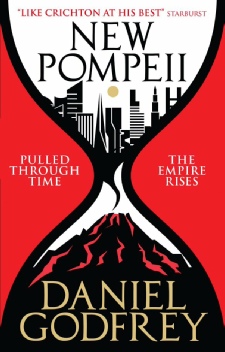



New Pompeii is available from the following links (declining availability!):



Reviews and Quotes
“I loved it. A fascinating and original blend of history, sci-
"A lean, clean, post-
“A smart, intriguing thriller in the tradition of Michael Crichton and Phillip K. Dick.” – Gareth L. Powell (Winner of the BSFA Award for Best Novel, 2013).
“New Pompeii is that rare science fiction novel that reads like a thriller – fast-
“Fascinating, cleverly wrought, intelligent and occasionally brutal, New Pompeii is a thrillingly original take on the time travel genre.” – Tim Lebbon, author of The Silence and The Hunt
“An exuberant, high-
“Just inhaled New Pompeii by Daniel Godfrey. Gone. Brilliant. Like timey-
Reviews (All External Links)
“New Pompeii’s vertiginously high-
“Godfrey’s intricately plotted, tremendously gripping time-
“If you like Michael Crichton at his best, then check out Daniel Godfrey. An exciting new talent." Starburst Magazine
“(A) rollicking debut …that should fill a void in the hearts of many a Michael Crichton reader. So irresistibly entertaining, it should be accompanied by a bottomless bucket of popcorn.” -
“[A] rollicking adventure in the well-
“Full of mind-
“The historical detail is impressive, the mystery is interesting and there’s a chewy time-
“Godfrey’s nuanced affection for all things Roman shines” -
“A compelling mystery (that) keeps us guessing at its solution until the very end. A smart, well thought-
“Daniel Godfrey's debut novel is literary superglue…I couldn't put it down till I'd finished it.” -


New Pompeii is a Financial Times “Books of 2016” pick!
New Pompeii was included in the Morning Star “Books of 2016” Review
Some time in the near future, energy giant NovusPart develops technology with an unexpected side-
For post-
But Nick soon realises that NovusPart are underestimating their captives. The stage is set for the ultimate clash of cultures in which time itself is a weapon…
* * *
About the Book!
New Pompeii is set in a near future world, where the technology exists to transport people and objects from the distant past to the present.
It’s one direction only – no one can go backwards in time – and a corporation uses the technology to transport the ancient population of Pompeii out of the path of the erupting Vesuvius, and into a replica city.
So why do they do this? Well, the company says it’s to create a historical research facility – something to balance up against all the controversy about the time travel technology and the many conspiracy theories that surround it… but, of course, it turns out to be more complicated than that.
We’re introduced to these real live Romans through the eyes of Nick Houghton, a historian, who soon realizes there’s something odd about why he’s been recruited – but also that they may be seriously underestimating a people who once ruled an empire…
New Pompeii is a science fiction novel with a large dose of historical detail running through it. I wanted to write something that tapped into my interest in Rome, but also do something a little different with the time travel aspect. I was reading a lot about ancient Rome and at the same time re-
Why Pompeii?
Pompeii has always fascinated me: a town which has been preserved so well that you can get a real picture of what life may have been like before the eruption. I’m very interested in history – most historians I guess would like to travel back in time – and I wanted to do something involving time travel that was different to other stories about Pompeii: so I took the eruption of Vesuvius at the starting point and asked ‘so what happens next?’
There’s also a very helpful mystery at the heart of Pompeii: where are all the people? The town was home to around 20,000 people but -
I knew quite a bit about ancient Rome before I started, but I have worked my way through any number of specific books on the site, and Roman society. I wanted to get as much of the detail right as possible – without slowing down the action or forgetting what I was writing was essentially a thriller.
(It’s a great place to visit too! But if you are thinking of going, you should also try to get to Herculaneum, which is a smaller but better preserved site further along the coast).